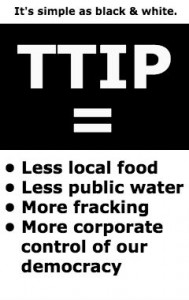By Eve Mitchell
 If you believe the sales pitch, this TTIP thing is too good to be true. Just ask EU Trade Commissioner Cecelia Malmstrom. Her speeches around Europe are peppered with examples of alleged “wins” designed to convince us it’s a good deal. I’m not buying it, and neither should you.
If you believe the sales pitch, this TTIP thing is too good to be true. Just ask EU Trade Commissioner Cecelia Malmstrom. Her speeches around Europe are peppered with examples of alleged “wins” designed to convince us it’s a good deal. I’m not buying it, and neither should you.
The themes the Commissioner is peddling are pretty easy to spot. Malmstrom is clear the Transatlantic Trade and Investment Partnership will make us richer by giving us more lucrative jobs under better governments with stronger economies in an apparent Shangri-la of international cooperation where “we stay well away from areas where we don’t agree” (like GM food and crops).
Sadly I suspect the lady, like Hamlet’s mother before her, protests a bit too much. All is not well in the house of TTIP. Back in February 2013 Malmstrom’s predecessor Karel De Gucht vowed to complete talks on the new trade agreement within two years. By March 2015, that was looking unlikely. Then there’s the study by Tufts University predicting an era of TTIP-driven “European disintegration, unemployment and instability” contradicting the official line. Malmstrom’s reply that “it is difficult to predict the impact of fiscal policy by 2027” does not appear to help those peddling the alleged need for TTIP.
Part of the problem is that one of the biggest areas where we don’t agree pits citizens against TTIP – 97% of Europeans don’t want an Investor/State Dispute Settlement mechanism to be included in the deal, but our governments seem keen to keep it. Hence the sales pitch full of promises to distract us.
In fact the repeated assurances on jobs and cooperation highlight nicely some of the greatest weaknesses in the TTIP project if you read between the lines.
In December 2014 Malmstrom told a debate in Brussels, “There can be no trade-off between our economic goals and our people’s health and safety, the environment or financial stability.”
Hang on. If we’re all cooperating and we’re all going to be better off, why would anyone even try to trade my health for financial gain?
Malmstrom said the agreement should be negotiated openly and transparently. If TTIP proponents really mean this, it is unclear why it took the intervention of the European Ombudsman to force the thing into the light. In any case, TTIP is still being negotiated largely in secret, so we won’t know what’s been traded away before it’s too late.
It’s happening on the both sides of the pond. In November 2014, Malmstrom explained that exports underpin jobs for about 10% of people working in Europe and, “Those jobs tend to be higher-skilled and therefore higher paying.” In February the U.S. Trade Representative, effectively the Commissioner’s counterpart, said exports support some 113 million jobs, so trade deals including TTIP mean, “We’re supporting more jobs, and these are good, high-paying jobs helping to increase wages for millions of Americans.”
Really? It seems unlikely that everyone will get a better, higher paid job, so it’s reasonable to wonder who will lose. Campaign group War on Want very helpfully crunched the numbers and found the Commission’s own impact assessment shows at least 1 million workers in the EU and U.S. will actually lose their jobs under TTIP. It wouldn’t be the first time. In 1993 proponents of the North American Free Trade Agreement (NAFTA) promised more jobs. By 2004 NAFTA had in fact cost 1 million U.S. jobs net (with 5 million manufacturing jobs lost).
Repeating this seems unwise.
Another big part of the problem is that the economic numbers just don’t stack up. Repeated official statements, including from the European Parliament, promise, “Every family could save €545 per year thanks to this treaty.” Manchester University begs to differ, saying, “An impartial reading of these key documents relating to TTIP shows quite clearly that these huge figures are vastly overblown and deeply flawed.” Even the UK Parliament’s Business Select Committee, hardly the cutting edge of anti-establishment protest, called on the government to “stop saying the deal could be worth £100bn” and come up with some real numbers. I’m not holding my breath.
It’s not hard to see why 1.6 million European citizens and 26 European trade unions are calling for TTIP to be scrapped, with more joining all the time. Now we need to make our politicians listen before it’s too late.
Please tell your MEPs that no deal is better than a bad deal, and TTIP is a bad deal indeed.


